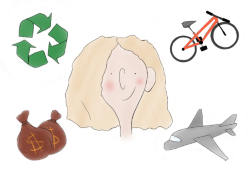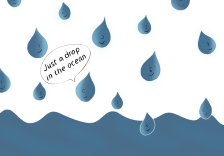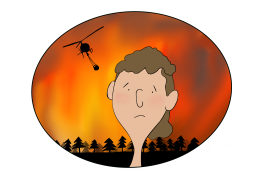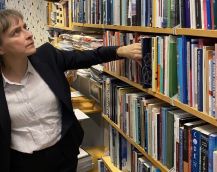Excuses we make for harming the climate

How do we excuse our own climate damaging actions? KTH Professor Nina Wormbs’ research project received media attention even before it started. “As a researcher, I have never seen such great interest and commitment.”
The recently completed research project "Understanding justification of climate change nonaction" studies how people who accept climate science reason about their choices. The topic is highly relevant, touching on existential issues with a high degree of relatability and emotional resonance. The research project was led by Nina Wormbs, Professor in History of Technology , together with Maria Wolrath Söderberg, Associate Professor in Rhetoric at Södertörn University College.
Unusual research method

Both conduct basic research with an interest in how people think. In this project, the duo used a rather unusual research method: rhetorical analysis of survey responses. They mapped thought structures and discovered a number of recurring arguments to excuse actions harmful to the climate. The most common was "budget reasoning", imagining a climate account where actions are weighed against each other. An example of this is "you can take flights if you are a vegetarian". It was also common to compare one's own actions with something worse.
Not isolated

It is often argued that individuals should not have to change their lifestyle as the climate crisis is caused at a structural level.
“Lifestyle problems and societal problems are not isolated from each other and should not be pitted against each other,” Wormbs says.
People influence each other in their way of thinking and engagement can legitimise systemic change. Wormbs and Wolrath Söderberg are investigating this in the newly launched research project "The Character of Social Engagement in the Climate Transition" . They seek to understand what makes people engage, and the processes behind norm change.
Very reflexive

The researchers also directed the survey questions towards themselves.
“Working with these questions makes you very reflexive. Analysing your own arguments can sow the seeds of change. Many participants in the survey have been influenced in their thinking about sustainability.”
Another survey, aimed at people who stopped flying for climate reasons, showed that knowledge plays an important role in making choices. Both conscience and fear can also lead to action, if you have experienced climate change and seen the danger with your own eyes: dried up wells, floods, or the smell of fire. It can also lead to change if you have seen the size and proportions of your own emissions. Many people who have made the change say that they want to be able to tell children and young people that "I did everything I could".
Economic thinking

“Thinking economically could be a way forward to save our planet. The problem with the budget reasoning is if you compare actions that are not comparable, such as flying and recycling. If you have a carbon budget, you simply have to stay within it. If we use economic thinking, we have to get the numbers right,” Wormbs says.
Climate research is not just about measuring changes in the Earth system. It needs to examine how the transition will work, economic instruments, new energy solutions, and questions about people's reasoning and understanding of context, she explains.
“The humanities have a lot to contribute. The important thing is that we start discussing these issues.”
Text: Jenny Rosen
Further reading about the research
Nina Wormbs och Maria Wolrath Söderberg: ”Grounded: Beyond Flygskam”
Nina Wormbs: ”I Still Do a Lot of Good”, The Rachel Carson Center Review
Nina Wormbs: ”Vintern är utrotningshotad - Den försvinner med ett stilla takdropp”, Dagens Nyheter (in Swedish)
”Så ursäktar vi vår påverkan på klimatet – mot bättre vetande”, Göteborgs-Posten (in Swedish)
